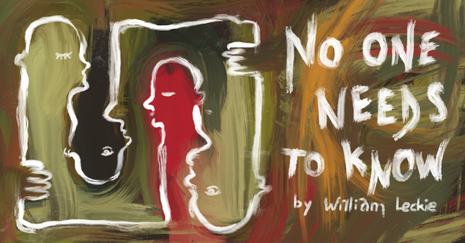No One Needs to Know review – less than the sum of its parts
Theatre Editor Fergal Jeffreys reviews No One Needs to Know at the Howard Theatre in Downing, Winner of the Other Prize 2020

There’s nowhere to hide with just four actors on a stage. No amount of lighting tricks or clever staging is going to obscure whether the acting is good, the writing pliant and the dialogue carefully timed. No One Needs to Know, performed from Thursday to Saturday at Downing had some moments of redemption but ultimately failed to make a series of stumbling conversations engaging enough for its long run time.
“Writer William Leckie has penned a slow brewing plot looking at suffering characters and their relationships with one another”
Staged in the gorgeous Howard Theatre in Downing college - a construction from the last decade modelled on a Georgian playhouse – No One Needs to know is about the destabilising of a family. A nuclear trio lives an uncertain existence: a loveless marriage left unaddressed between Steven and Martha, a son Alex concealing his sexuality from his father.
This all changes with the return of a young family friend Danny who becomes the romantic distraction of both mother and son. The equilibrium threatens to shift forever when Steven leaves for South Africa and the secrets underpinning the family’s stability are revealed.
The script for No One Needs to Know won the Other Prize in 2020 and it’s easy to see why. Writer William Leckie has penned a slow brewing plot looking at suffering characters and their relationships with one another. The emphasis on generational conflict and family balance also gives the plot a pleasing neatness.
Yet this script doesn’t land well on the stage. To start with its too long. There are stretches where nothing much seems to happen except signposting of attraction and hinting at secret resentments. When these come into the open the play takes off - Ben Phillips confession is delivered terrifically, teasing out the threads of guilt and embarrassment in his characters sexual assault.
Yet for all to long the play seems to mince around. When it does come to a conclusion it’s reached via an all too convenient letter resulting in a fumbling, prolonged exit. Lots could have been cut here. Frustrating too was the tonal coherence. On paper this was meant to be a dark, realistic piece of theatre yet quite often the audience quietly sniggered. The father, played by Xoan Elsdon, was meant to be an antagonist and was certainly chauvinistic. But I can’t help feeling that his attempts to connect with his family were well meaning and not quite as pathetic as the direction intended the audience to think.
“Two characters competed across the play to give the more nonspecific pronunciation”
The acting across the whole play was robust – each actor had clearly thought about where their character was and where they were going. Yet the dialogue felt stiff. Pauses between the lines sapped any fluency out of the conversation and given that breaks were used elsewhere in the script to signal desire, how often dialogue got stuck made the whole thing unfortunately messy. It is also worth noting the accents. Two characters were meant to be from South Africa but competed across two hours to give the more nonspecific pronunciation. An interesting choice.
The lighting and direction could be effective at times – the scenes in a club worked well with flashing lights as a contrast to the brightly lit house. Yet too often there was confusion about where people were. Was the sofa a bed and whose bed? Lighting on one half of the stage implied that those speaking there couldn’t be heard but often someone would be listening in. Where was the entrance to the place? This might seem pedantic but that it lacked specificity meant the four cast members seemed to rotate around a fairly meaningless space.
There were some great moments in this play – the cast as individuals were clearly talented, the plot engaging and thematically timely and the set and sound effectively built. Yet as a whole No One Needs to Know just couldn’t stand up.
 News / Colleges charge different rents for the same Castle Street accommodation2 March 2026
News / Colleges charge different rents for the same Castle Street accommodation2 March 2026 News / King’s hosts open iftar for Ramadan3 March 2026
News / King’s hosts open iftar for Ramadan3 March 2026 News / Angela Merkel among Cambridge honorary degree nominees27 February 2026
News / Angela Merkel among Cambridge honorary degree nominees27 February 2026 Theatre / Lunatics and leisure centres 4 March 2026
Theatre / Lunatics and leisure centres 4 March 2026 News / News in Brief: waterworks, wine woes, and workplace wins 1 March 2026
News / News in Brief: waterworks, wine woes, and workplace wins 1 March 2026









